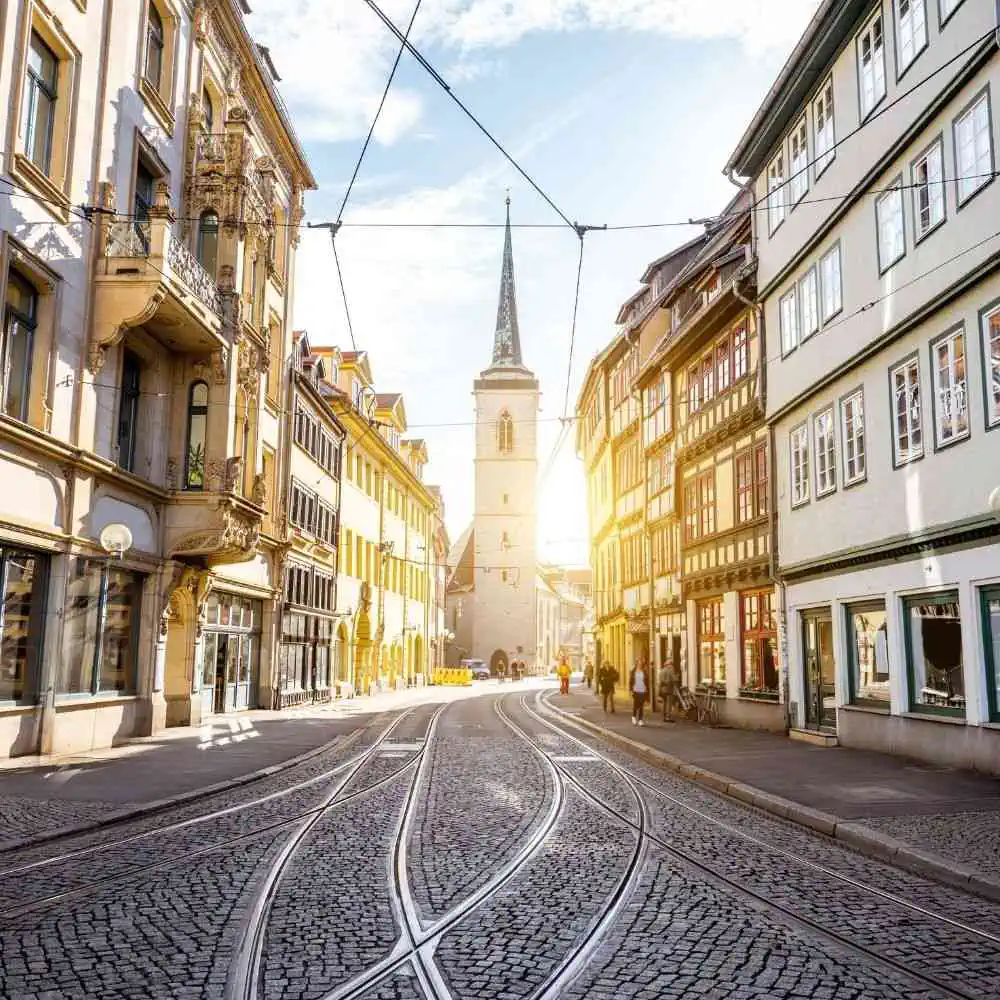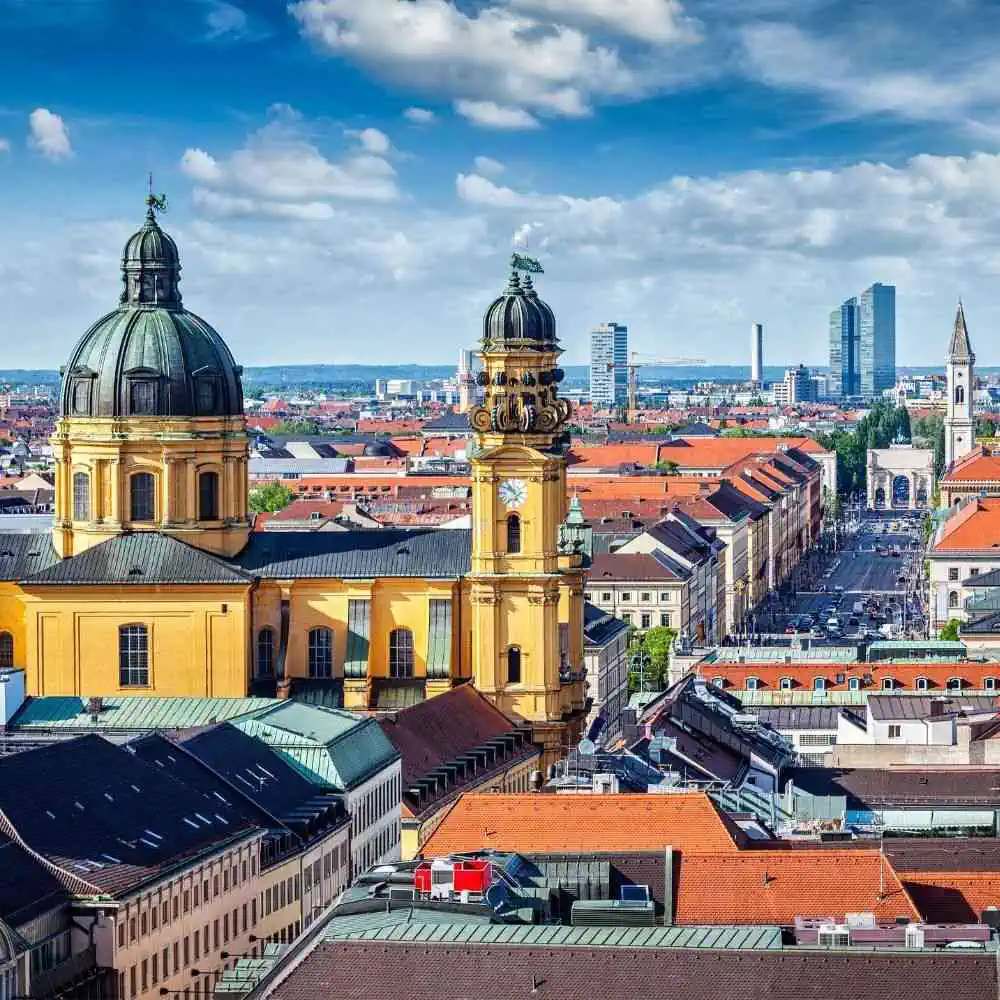Partirai da Monaco Stazione Centrale, situata proprio nel centro della città di Monaco di Baviera, e godrai del bellissimo paesaggio del viaggio mentre arrivi a Erfurt Stazione Centrale, situata anche essa nel cuore di Erfurt.
Treni da Monaco di Baviera a Erfurtda $ 32.64
Treni da Monaco di Baviera a Erfurt
Viaggiare in treno: Monaco di Baviera - Erfurt
Travelling by train from Munich to Erfurt is a great way to explore the great beauty of Germany. The journey takes approximately 4 hours and 44 minutes, passing through some of the most iconic cities and towns in the region. The total distance covered is around 302 km.
The journey begins at Munich Central Station, where you can admire the extensive architecture and find all kinds of shops. Next, you will pass by Nürnberg, where you can visit the Nuremberg Castle, or Bamberg, with its breathtakingly scenic landscape. Other important cities and towns along the way include Würzburg, Bad Kissingen, Hersfeld-Rotenburg, Bebra, and Sontra. You will also have the chance to visit Erfurt Old Town, complete with its impressive Town Hall.
The most iconic item you can find during the departure and the arrival is a replica of the famous German steinmühle. It's a must-have item for any traveler to Germany, and you can find one both at the point of departure from Munich Central Station, and the arrival at Erfurt Station.
A train journey from Munich to Erfurt is a great way to explore the German countryside and all its beauty, while also getting to visit some of the most iconic cities and towns in the region.

Dettagli del viaggio
How long does the train from Munich to Erfurt take?
The average journey time by train between Munich and Erfurt is approximately 2 hours and 45 minutes. Travel times can vary based on specific routes or service changes.
What is the fastest journey from Munich to Erfurt by train?
The fastest train journey from Munich to Erfurt can take as little as 2 hours and 30 minutes. This duration can vary depending on the train service used and the number of stops.
How much does the train cost from Munich to Erfurt?
The cost of a train ticket from Munich to Erfurt can vary greatly depending on the time of booking, class, and flexibility. Prices start from €30 when booked in advance.
How much does the Munich to Erfurt?
Yes, there are direct train services from Munich to Erfurt, allowing for a seamless travel experience without the need for transfers.
What is the distance from Munich to Erfurt by train?
The distance from Munich to Erfurt by train is approximately 300 Km. This distance is covered in an efficient and comfortable manner using the modern rail network.
Which are the cities that the train stops from Munich to Erfurt?
On the journey from Munich to Erfurt, the train may stop in key cities such as Nuremberg and Bamberg. However, the exact stops can vary depending on the specific train service chosen.
Monaco di Baviera: Luoghi da visitare
Scoprire Monaco di Baviera significa immergersi in una città dove la storia incontra la modernità, dove i palazzi maestosi si affiancano a vivaci biergarten, creando un mosaico culturale unico nel cuore dell'Europa. Pronti a esplorare i suoi tesori nascosti?
Marienplatz
Il cuore pulsante di Monaco, famoso per il Glockenspiel nel Nuovo Municipio. Visita al mattino per assistere al carillon. Ubicazione: Centro città. Costo: Gratuito.
Residenz München
Un tempo dimora dei re di Baviera, oggi è uno dei più grandi musei palazziali d'Europa. Non perdere l'Antiquarium. Ubicazione: vicino a Odeonsplatz. Orari: 09:00-18:00. Costo: €9.
Castello di Nymphenburg
Una magnifica residenza estiva con giardini che ricordano Versailles. Perfetto per una passeggiata romantica. Ubicazione: periferia ovest. Orari: 09:00-18:00. Costo: €8.
Deutsches Museum
Il più grande museo di scienza e tecnologia al mondo, con esposizioni interattive. Un must per famiglie. Ubicazione: Isola del Museo. Orari: 09:00-17:00. Costo: €14.
Chiesa di San Pietro
La più antica chiesa della città offre una vista mozzafiato dalla sua torre. Ubicazione: vicino a Marienplatz. Orari: 09:00-18:00. Costo: €3 per salire la torre.
Viktualienmarkt
Un paradiso per gli amanti del cibo con prodotti locali e internazionali. Ottimo per un pranzo al volo. Ubicazione: a pochi passi da Marienplatz. Orari: 08:00-18:00. Costo: variabile.
Englischer Garten
Uno dei più grandi parchi cittadini al mondo, perfetto per un picnic o per il noleggio di una barca a remi sul lago. Ubicazione: zona nord-est. Costo: Gratuito.
Non limitarti a Monaco: la Baviera nasconde gioielli come il Castello di Neuschwanstein e la romantica strada degli Alpini, facilmente raggiungibili per una gita di un giorno. Monaco è solo l'inizio di un'avventura indimenticabile nella storia e nella natura!

Erfurt: Luoghi da visitare
Erfurt is one of the oldest cities in Germany, located in the heart of the Thuringia province. It has a rich history, full of fascinating architecture, monuments, and culture. A trip to Erfurt promises to offer a unique insight into Germany’s past, with plenty of opportunities to explore and discover. Here are seven of the best places to visit and what to eat when you’re in town.
Church of St. Severus: The Church of St. Severus is the oldest structure in Erfurt, dating back to the 8th century. Its Romanesque and Gothic-style architecture and impressive vaulted ceilings make it truly one of a kind. Entrance to the church is free, and it’s open from 10am to 4pm. Make sure to check out the elaborate altarpiece and the 11th-century baptismal font.
Krämerbrücke: The Krämerbrücke is an iconic bridge in Erfurt with a remarkable history. Built in 1325, the bridge, spanning over the Breitstrom river, contains over 30 quaint, half-timbered houses built during the Middle Ages. Today, many of these houses are filled with small shops selling traditional Thuringian handicrafts and souvenirs.
Erfurt Cathedral & Chapel: This Gothic structure is home to the city’s most important religious buildings. Erfurt Cathedral, built in the 13th century, is an impressive sight, with fascinating artworks and a great view of the city. The Chapel of St. Mary, which dates back to 1490, is another architectural gem and is open from 10am to 5pm.
Merchants' House: One of Erfurt’s oldest homes, the Merchants' House is a delightfully preserved building from the Middle Ages. Located in the heart of the city, the house was originally constructed in the 13th century and remained in the same family until World War II. It now serves as a museum and is open daily from 10am to 5pm.
Fischmarkt: This old-fashioned market square is the ideal spot to pick up some fresh produce and other treats. You’ll find stalls selling all kinds of food, and the local specialties such as Thüringer Rostbratwurst and Thüringer Klöße, a type of dumpling, are a must-try.
Moritzburg Fortress & Museum: Perched on a hill overlooking Erfurt, this magnificent fortress, built in the 14th century, is a sight to behold. It’s now home to a museum of Thuringian history, with a collection of coins, weaponry, and artwork from the Middle Ages. Entrance to the museum is free, open from Tuesday to Sunday between 10am and 4pm.
St. Augustine's Monastery: This stunning Romanesque-style monastery was once the site of Martin Luther’s religious awakening. Today, the monastery houses the university library and is open to visitors from 10am to 4pm.
Erfurt is the perfect destination for anyone looking for an unforgettable trip full of history and culture. Make sure to try some of the city’s delicious traditional dishes and explore its unique architecture. You’re sure to have a memorable experience!

Monaco di Baviera: Principali stazioni ferroviarie
La stazione ferroviaria principale di Monaco di Baviera, conosciuta come München Hauptbahnhof, è il nucleo pulsante dei viaggi ferroviari in questa storica città tedesca. Non solo gestisce il traffico nazionale e internazionale, collegando Monaco con le principali città europee, ma funge anche da punto di snodo per i trasporti locali. Sebbene München Hauptbahnhof sia la stella principale, Monaco vanta altre stazioni rilevanti come München Ost (Munich East) e München-Pasing, che facilitano l'accesso a diverse parti della città e ai suoi dintorni.
L'indirizzo esatto della München Hauptbahnhof è Bahnhofplatz 1, situato nel cuore della città, rendendola facilmente accessibile per i viaggiatori. La stazione è aperta 24 ore su 24, offrendo massima flessibilità di viaggio. Per quanto riguarda i servizi di deposito bagagli, sono disponibili armadietti automatici e un servizio di deposito gestito, così i viaggiatori possono esplorare la città con le mani libere, sapendo che i loro bagagli sono in un luogo sicuro. Questi servizi rendono München Hauptbahnhof un hub conveniente e affidabile per chi viaggia attraverso l'Europa.
- Monaco Stazione Centrale
- München Ost
- München-Pasing
- München Hackerbrücke
Erfurt: Principali stazioni ferroviarie
The main train station of Erfurt, in Germany is Erfurt Hauptbahnhof. This is one of the largest stations in the city, servicing thousands of travelers daily. There are also some other train stations, such as Erfurt West, Erfurt Süd, Erfurt Nord and Steigerwaldbahnhof.
The Erfurt Hauptbahnhof is located at Willy-Brandt-Platz 3, 99084 Erfurt. Opening hours are from 5:00 a.m. to 0:30 a.m. daily. The station has luggage storage facilities with prices ranging from €5.00 to €10.00 per 24 hours. The contact telephone number is +49 361 6511-0.
- Erfurt Stazione Centrale
- Erfurt Nord
- Erfurt-Gispersleben
- Erfurt-Bischleben
- Erfurt Ost
Monaco di Baviera - Erfurt: Come ottenere le migliori offerte
Prenota in anticipo:
Come per le tariffe aeree, i prezzi dei biglietti dei treni tendono ad aumentare man mano che si avvicina la data di partenza. Prenotare settimane o addirittura mesi in anticipo può farti risparmiare una notevole quantità.
Viaggia durante le ore di minore affluenza:
Evita di viaggiare durante le ore di punta, come le mattine e le serate feriali. Opta per viaggi a metà giornata, tarda serata o a metà settimana quando c'è meno domanda.
Considera treni più lenti o percorsi non diretti:
I treni espressi o ad alta velocità possono risparmiare tempo, ma spesso sono più costosi. Optare per servizi regionali o più lenti può ridurre la tua tariffa.
Cerca offerte speciali e promozioni:
Le compagnie ferroviarie occasionalmente hanno promozioni o offerte speciali, specialmente durante le stagioni di bassa affluenza. Vale la pena iscriversi alle newsletter. Inoltre, a volte ci sono sconti per gruppi o per biglietti di ritorno, quindi considera queste opzioni se si adattano ai tuoi piani di viaggio.
Argomenti popolari
Tutto ciò che c'è da sapere su
Hai bisogno di aiuto?
- Contattaci
Pagamento sicuro garantito
Certificati


